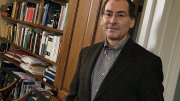Two of Harvard’s most venerable humanities disciplines have slashed decades-old concentration requirements in recent months, marking 2008-09 as a year of considerable curricular change in the foundational literary fields. Both English and the classics have voted to move to far more elective-based programs that department leaders have hailed by turns for their relevance, flexibility, and accessibility.
For all their apparent novelty, the revised degree requirements have won general support within the two departments: faculty members insist that the changes represent not modern concessions in a world less receptive to Western heritage, but refinements that will make transmission of that heritage more effective.
“A lot of people, when they first hear about this program, say, ‘Here’s the Western literary canon being eviscerated,’ and that’s not what we’re doing at all,” says Marquand professor of English Daniel Donoghue, the department’s director of undergraduate studies. “The people who are saying that haven’t read the program. We’re selecting works of canonical literature and asking, ‘How are we going to teach this? How are we going to get this information to the students?’”
The new English configuration replaces a previous requirement for a year-long survey of British literature that drew consistently poor reviews from concentrators, as well as other degree prerequisites, including a sophomore seminar and courses in American and pre-1800 literature. Incoming concentrators will now be expected to fulfill a single requirement in each of four “common ground” areas: Arrivals (focusing on how British literature, from its beginnings in the seventh century, is a product of cultural importation); Diffusions (dealing with the dispersion of “British” literature across the globe, beginning with England’s seventeenth-century expansion and imperialism); Poets (emphasizing non-dramatic poetry); and Shakespeares (treating the Bard and his heirs in a cultural context).
The new scheme, professors say, represents a course of study that separates Harvard from its peers by expanding upon the traditional, chronological progression that traced a line from Beowulf to Chaucer to Spenser, and straight onward. “Is that linear model sufficient to describe what’s happening? Because it’s just a temporal sequence, like the biblical begats,” says professor of English Gordon Teskey, discussing the curricular reformers’ thought process. “Is there some way that literature could take into account geography as well as time?”
The fresh model is more an hourglass than a line, Teskey says, allowing for the fact that English literature was not conceived in the British Isles alone, in isolation from the rest of the world, and is certainly not confined to the British Isles now—when some of the most vibrant English-language literature is being composed far from Britain. “We studied English literature or we studied American literature and the idea was that these traditions were rooted in one place and the expression of one geography,” says Loker professor of English James Simpson, a member of the curriculum futures committee that drafted the new program. “The inflow course [Arrivals] and the outflow course [Diffusions] take a different tack; rather than stressing rootedness, they stress cultural mobility.”
But the changes are more than a matter of curricular philosophy, Donoghue stresses, pointing to a renewed emphasis on advising that will help anchor the new program. Students will be assigned to a professor for big-picture guidance, while relying on the director of undergraduate studies for more personalized steering in a concentration that now aims to allow more room for movement by including seven free-choice electives among its 11 non-honors degree requirements. “We as a department wanted to move away from the idea that electives are somehow a sign of weakness in the program, that there’s chaos attached to them,” he says.
With Donoghue already pushing ahead to implement the new program for the fall term, his colleagues across Quincy Street, in the classics, unanimously approved their own curricular revisions at a meeting in early March, capping the department’s most detailed look at its concentration requirements in more than 30 years. Gone are the comprehensive general examinations previously required for graduation—and with them the decades-old reading list from which the examination material was drawn. The concentration’s seven potential tracks—on whose strength the classics entry monopolized a full 12 pages in this year’s undergraduate Handbook for Students—will be reduced to two: one emphasizing a knowledge of classical history, philosophy, and archaeology; the other, proficiency in the ancient languages per se. The language requirement itself is less burdensome: the six language courses required by the new track fall short of the eight that the current sequences demand.

Rose Lincoln/Harvard News Office
Mark J. Schiefsky
Department leaders, led by professor of the classics Mark J. Schiefsky, director of undergraduate studies, who initiated the curricular review in the fall, have suggested that the new formulation will make the concentration more accessible. It eliminates the obstacle that the long-standing reading list and general examination posed for those students lacking the high-school Latin and Greek training that was once a staple of secondary-school curriculums. There is also hope that the general examination’s demise will increase pedagogic creativity, liberating professors who have sometimes felt they could draw students only by offering syllabi that included material covered by the exam.
Mirabile dictu, students within the department have not rushed to embrace the generals’ demise. “We wanted to make it clear from our side that many students liked the idea that there was a final milestone to hit,” says Paul Mumma ’09, a concentrator who serves as one of two student liaisons to the department’s faculty. “That was really the only difference of opinion between faculty and students.”
Students pushing for more exams? It’s not for nothing that the English department’s Simpson compares the construction of a curriculum to “getting a Rubik’s Cube into place.” But one thing seems clear: the new general-education program, scheduled for introduction this fall, won’t be the only curricular novelty Harvard educators will be watching with fingers crossed.









